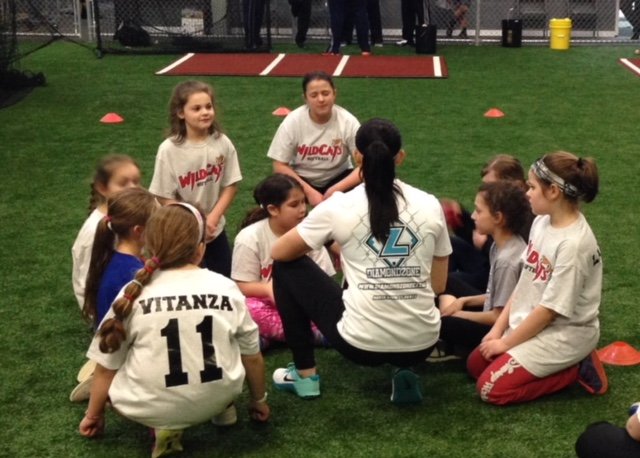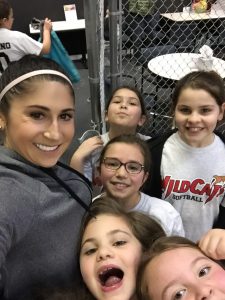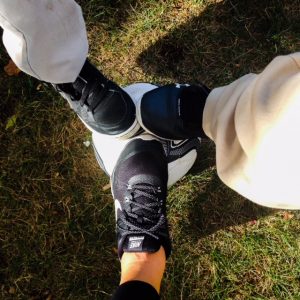Developing Better Athletes through a Mindfulness Approach
By: Melissa Lambert
In a technologically advanced society comes a shift in human behavior and in what we should expect from young athletes. Parents and coaches are looking for the solutions on how to help their young athletes become “mentally tough”, eliminate the “perfectionistic views” and decrease their outburst on the playing field. The answer is adjusting strategies in the way in which challenges are handled. Although social media has created connection, stronger marketing, learning and awareness it also comes with a toll. The next generation is living in a world of instant gratification from immediate approval of their status and become the way in which they socialize. There is no longer face-to-face contact; coaches are turning to group text messages, email and social media for meetings and communication. Children are also involved in multiple activities with limited time for family interaction.
Coaches have the ability to change lives and teach skills that are often missed in school and home. However, there needs to be a shift in which coaches behave, model and understand the issues that young athletes are faced with. The lifetime prevalence for anxiety increases by 25% from mild to moderate for 13-18 year olds. Reasons for the increase include terrorism, social media, being over-scheduled, parental pressures and perceived threats. If children don’t have the skills to appropriately manage these fears it can often lead to depression (APA, 2017). Coaches are not working with the most comfortable, confident and well-rested athletes. However, there are several mindfulness approaches that can be taken to build a solid foundation for young athletes to develop.
People often associate mindfulness with yoga and meditation but it is more than that. It is a mental state achieved by focusing on the present moment and it is challenging for many unless they make it part of their regular practice. To be able to focus in the current moment is a skill that a busy life will make more challenging to achieve. Just like understanding the technical and tactical components of any sport also comes the ability to eliminate distraction, learning to be comfortable in uncomfortable situations and then being able to translate these skills to all other environments. This is difficult for adults to do but you will find yourself having a greater impact as a coach if you can follow these simple skills and model them for your athletes.
Recognize what your triggers are and how you respond to them. One of the biggest lessons we can teach our young athletes is normalizing the emotions they feel towards situations but the skill comes to recognizing the emotions and managing them appropriately. We can all think of a coach that takes more of a reactive approach and although showing emotion in a sport has its place, more often than not it will have a negative impact on performance. To help each young athlete reach their fullest potential they need to understand how emotions impact behavior. For example, if a young baseball player cries and gets down on himself every time he strikes out, the cycle will continue unless something is done differently. This is a perfect opportunity as a coach to recognize the lack of self-confidence and respond through teaching instead of reacting to the emotion. Help the athlete understand the challenges of baseball and the likelihood of being unsuccessful at bat is part of the game. Find out where the strong emotions are coming from to drive your approach in addressing it. It requires a lot of self-awareness and patience to view each athlete in this manner. At the same time, young athletes are learning to problem-solve through difficult situations with guidance.
Create an in season and personal schedule. To be an effective coach you have to be organized and consistent in messaging. The more organized you can be the better your athletes will respond in the same manner. Coaches often focus on their practice and game schedule alone but making time for everything else is just as important. With the fast paced lives of our young athletes and technology, boundaries are easily blurred on how to prioritize. Ensure scheduling expectations are addressed right from the beginning for both yourself and athletes. This includes appropriate communication. Is it acceptable for your athletes to text you or maybe you prefer scheduling face-to-face time to discuss conflict? By communicating effectively it sets the tone for helping them get their needs met not only on the playing field but also in their personal lives. There needs to be awareness that athletes are often running around from one activity to the next. One way to help with focus and set expectations is identifying performance mode and nonperformance mode. When athletes step onto the playing field it means they are ready to be a performer and when they step off for the day, they need to leave it there. This allows for some autonomy in building the right mindset for training and game play by separating their expectations as an athlete. Playing sports is something they do but it is not who they are.
Educate and lay out the expectations for parents. We know we never just work with young athletes without working with the parents. The same emphasis on expectations set for the team should also be set for parents. This includes communication, education, skill work and goals. Coaches will work hard to manage the right environment for athletes however they hit a roadblock once parents interfere. First assess the developmental age of the athletes you coach. What are their needs at that age? What level of responsibility can they handle and what do they depend on from adults? Before starting practices, lay the ground rules for parents. Players who are frequently late indicate a hectic lifestyle or a lack of accountability. Let them know what the expectations are and how you will address it if it happens. Character building is where the skill work comes in. Parents need to understand modeling is a great way to teach. If we are teaching mindset skills to our athletes, managing uncomfortable situations and learning how to decrease reactivity based on emotions we need families to do the same for their athletes. Contrary to how many parents feel about their son or daughter being an all-star only a small percentage will continue playing past high school. Let parents know what sports are really about for the child. The lessons are greater then what happens on the field.
Create uncomfortable situations for athletes in practice and help them work through it. Part of having a strong mindset as a coach and as an athlete is to invite uncomfortable situations. The more direct exposure we have to things that create anxiety and fear the better we are at managing them. This isn’t a skill that happens overnight. As a coach you need to practice this yourself in order to translate it to your athletes. What this doesn’t mean is taking an athlete with low confidence and having a highly skilled athlete humiliate him or her. This is a gradual process and requires knowing each athlete as an individual and the culture of the team. By knowing how you respond to external stimuli, you are able to gain control and stay focused during challenging situations. An example could be putting players under higher defensive pressure when he or she gets the ball. This will force an athlete to make quicker plays without choking in game situations. Another example is practicing in bad weather and focusing on playing with the same intensity and enthusiasm. This shouldn’t end in performance mode only, challenge your athletes to do something they are scared of that doesn’t compromise safety. Maybe it’s smiling at every person they walk past in the hallway of their school or raising their hand in class to answer a question they wouldn’t normally feel comfortable doing.
As a coach you always want to think about how to build better athletes, and like anything, it requires additional practice off the playing field. However, mindfulness doesn’t happen overnight and requires adjusting to how we normally do things. Once you have developed these skills for yourself you can establish a better learning environment for your team to reach peak performance.
Resources:
Anxiety Disorders Association of America
American Psychological Association
Melissa Lambert is a Licensed Professional Counselor in the state of Connecticut and is currently the School Based Clinician for East Haven High School and Middle School. Melissa was previously a Director for an intensive group therapy program. She earned her Bachelor’s degree in Psychology as a collegiate athlete from Eastern CT State University and Masters of Education in Clinical Psychology with a concentration in child and adolescent Psychology from Springfield College. Melissa’s experience includes working with children in various crisis settings. She is certified in the 7 Challenges Model for adolescent substance abuse, Life is Good playmakers, Cognitive Behavioral Therapy and Acceptance and Commitment Therapy. She also implemented an international jump rope program for children with trauma, poverty and experiencing inner city violence.
In addition, Melissa is Certified in as International Youth Conditioning Specialist Level 2 and Speed and Agility. She is a performance coach at Diamondzone and is currently implementing a mental skills program for high school athletes.





0 Comments for “Developing Better Athletes through a Mindfulness Approach”